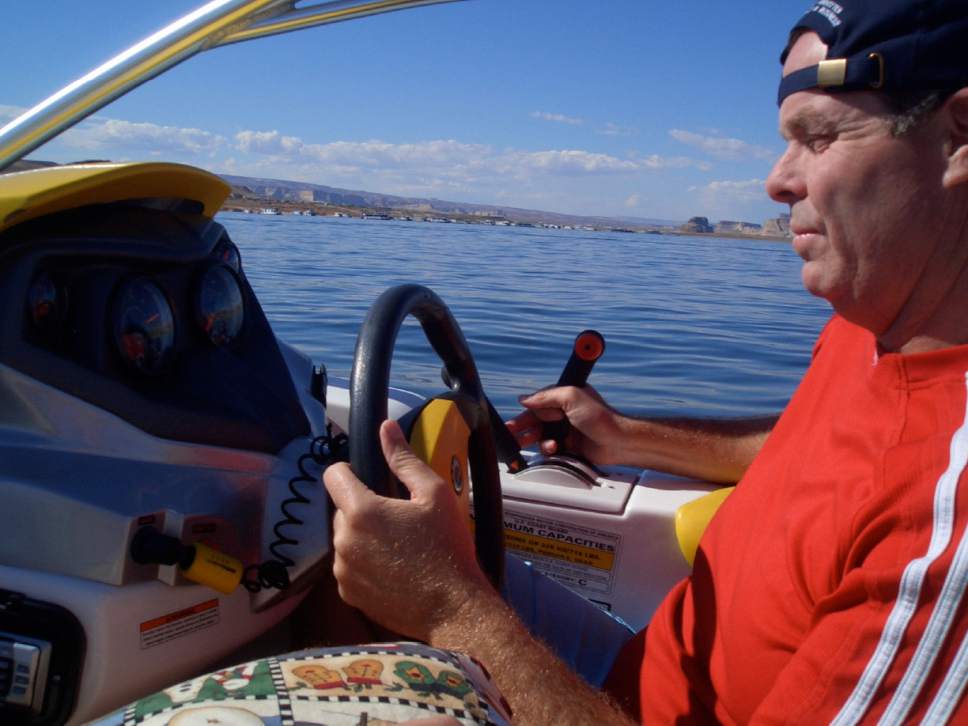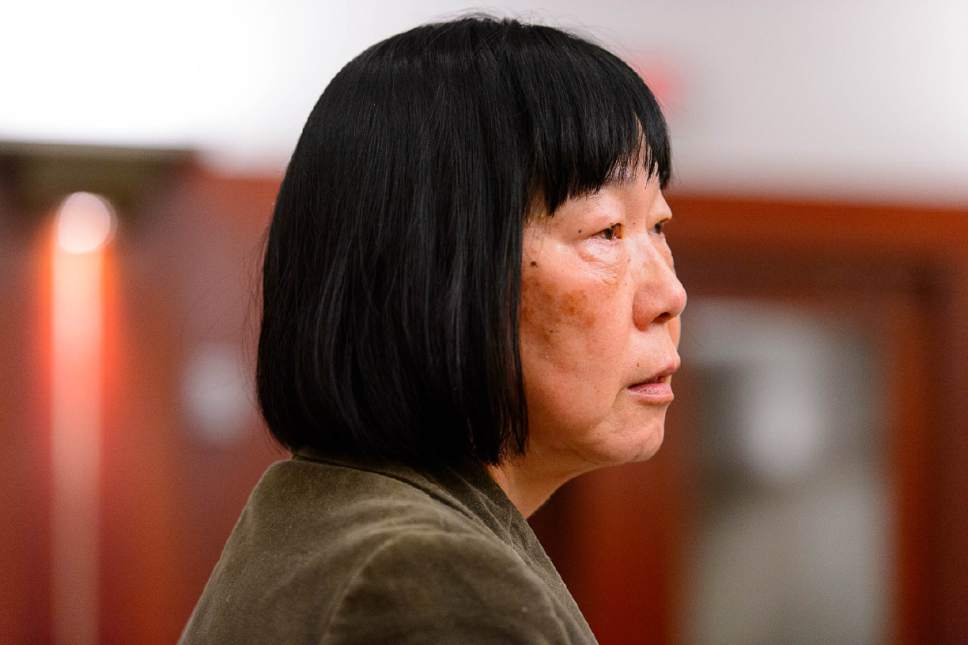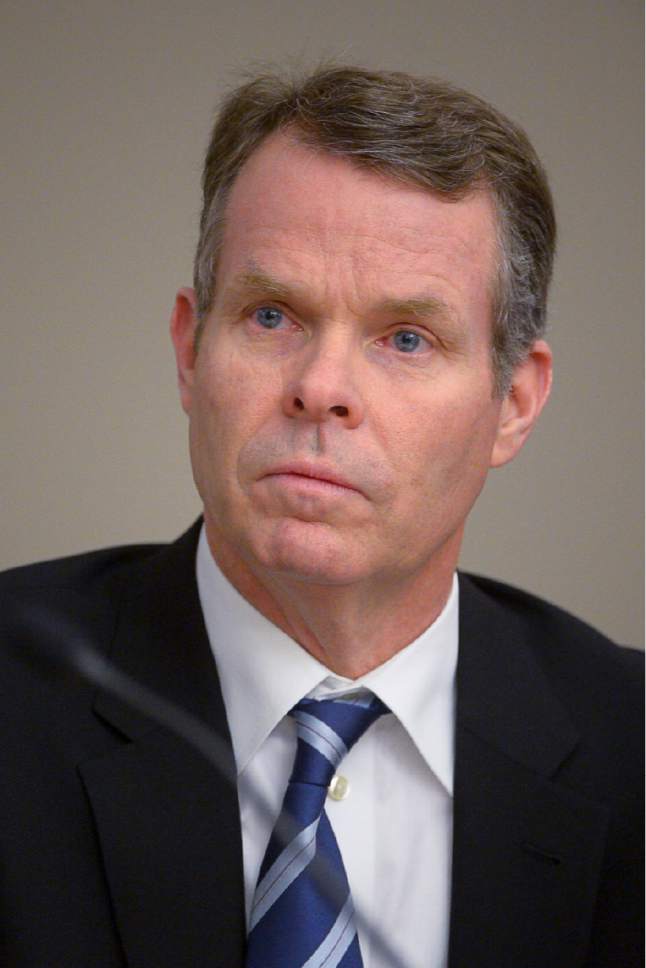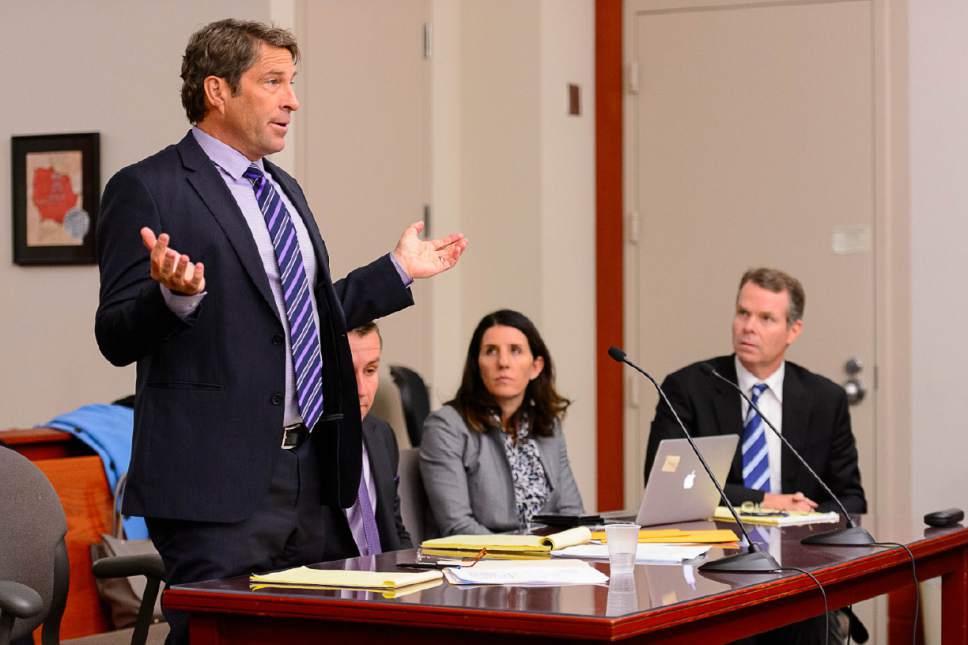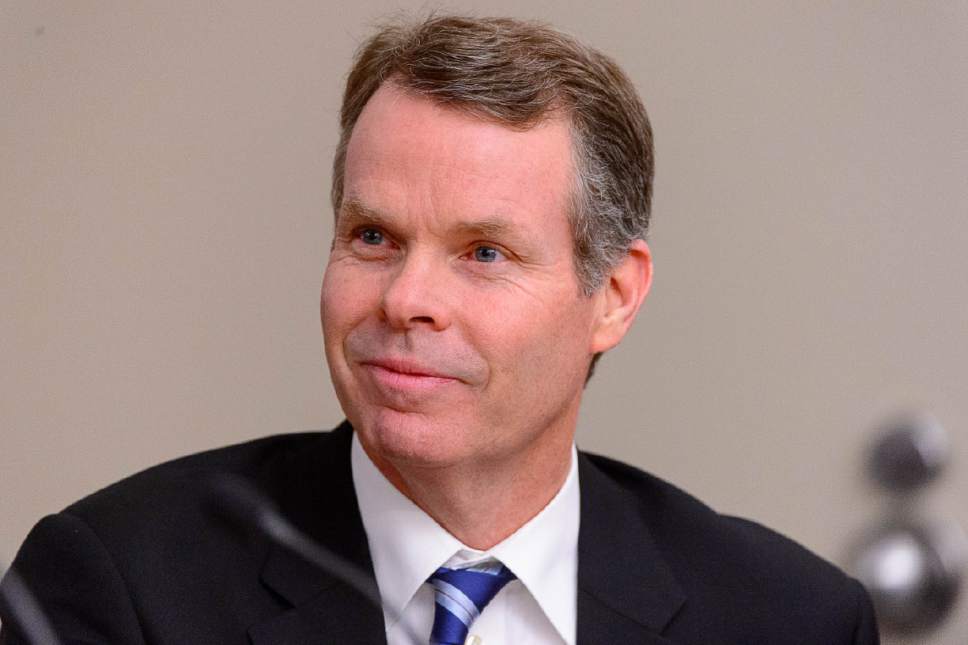This is an archived article that was published on sltrib.com in 2017, and information in the article may be outdated. It is provided only for personal research purposes and may not be reprinted.
Four days after John Swallow was sworn in as Utah's new attorney general in January 2013, his political house began to crumble.
The crack in the foundation came after a bombshell federal court hearing for an indicted St. George businessman, who said Swallow had been party to an attempted bribe of a powerful U.S. senator.
The earth began to shake and the allegations spread: Pay-to-play inside the Utah attorney general's office; money and favors buying legal cover and protection from the state's top cop, a pattern set, prosecutors argued, by Swallow's immediate predecessor, Mark Shurtleff.
It became the biggest political scandal ever to rock the state.
Come Tuesday, more than four years later, Swallow, who resigned as attorney general after just 11 months, is scheduled to stand trial on 13 public-corruption-related charges that could send him to prison for 30 years.
He was not the only person charged. Shurtleff and his so-called "fixer," Tim Lawson, once faced multiple felony counts. But those cases evaporated — Shurtleff's was dismissed; Lawson died last year.
That leaves only Swallow facing prosecution, though Shurtleff's 6-foot-5 shadow will loom large over the proceedings. Indeed, much of the testimony will center on Shurtleff as well as his handpicked successor.
Salt Lake County prosecutors contend that, together, Swallow and Shurtleff, with Lawson's help, conspired to amass money and power that would get them in office and keep them there.
"Shurtleff was at the apex of the conspiracy, the guy who called all the shots," Deputy District Attorney Fred Burmester said during a recent court hearing.
"Lawson was the muscle, who intimidated and threatened, and Swallow was the moneyman," he added.
Jury selection in the 16-day trial is set to begin Tuesday in Salt Lake City's 3rd District Court.
That it has taken so long to get Swallow's case from investigation to trial is a function of both its difficulty and complexity, Salt Lake County District Attorney Sim Gill said.
There were, he notes, multiple probes — by the Utah House, the attorney general's office, the lieutenant governor's office and by state and federal criminal agencies — each with its own set of responsibilities and roles.
"To narrow it down to a particular set of things we could focus on within our limited jurisdiction … it's a monumental task," Gill said.
Swallow's prosecution also sends a message to the wider community about a shared commitment to community values, ethics and acceptable behavior.
"In our form of government, nobody is above the law," he said, noting that Swallow is innocent until proven guilty. "If you cross the line, there will be consequences."
Shurtleff and Swallow were named as co-defendants in 2014 when Gill, a Democrat, and Davis County Attorney Troy Rawlings, a Republican, filed multiple counts against the pair.
The state cases were brought after the U.S. Department of Justice's Public Integrity Section declined to bring federal charges.
That's something the jury won't hear, a detail Swallow attorney Scott C. Williams contends is vital to the case.
DOJ's decision angered state and federal agents and spurred their desire to work with Gill and Rawlings so they could continue what Williams has sometimes called not an investigation, but an "inventigation."
"They were incentivized because they were turned down by the feds," Williams said. "So they designed their process with an end in mind, not to find out what is, but to create what they would like it to be. It's a conclusion they have invented evidence to reach."
Shurtleff couldn't agree more.
He raised the issue in motions last year, citing dozens of examples of investigators allegedly lying or twisting the facts.
The former three-term attorney general said that's why prosecutors don't want to put him on the stand: He could undermine their case.
How? First, Shurtleff said, because he was a party to key conversations or present at events the jury will consider, he could counter assertions made by prosecution witnesses.
Second, Shurtleff is intimately familiar with the state's evidence.
"I've read it all and I've lived it, and I've been through it preparing my own defense," he said. "I can impeach their witnesses and go after the credibility of their investigators."
Gill declined to respond to Shurtleff's assertion, but said: "There's only one person on trial here, it's Mr. Swallow."
For his part, Williams sees the case as being more about Shurtleff than his client.
Recent testimony from convicted businessman Marc Sessions Jenson, Williams noted, focused mainly on Shurtleff. Before the hearing, the lawyer added, Jenson, who testified to being shaken down by Shurtleff and Swallow for money and favors, was considered "almost invisible" in relation to Swallow's case.
"Now he's the absolute star witness. He's the first one," Williams said. "... So it appears that either by complete frustration that his case was dismissed or other motives, they are going to do their best to try Mark Shurtleff in this case and attach Mr. Swallow somehow to that."
Williams scoffs at the suggestion of a three-cornered conspiracy or a cabal. There's no evidence, he asserts, that shows Shurtleff, Swallow and Lawson agreed to a scheme to break laws.
The case, he contends, is really about politics.
"This is about the dethroning of a politician that was successful," Williams said. "They should have stopped there. There is no crime."
And politics is all Williams fears a jury might see.
"The political damage has been done," he said. "But I believe, unfortunately, [prosecutors] are going to try and sway people's opinion by focusing on a politician, not a man, husband, father, grandfather and Utah citizen that was overwhelmingly elected to his political post."
Politics aside, Swallow's lawyers still will have to defend allegations that surfaced in the findings of multiple reports, which helped fuel his criminal prosecution.
Among those findings:
• That Swallow used businessman Jeremy Johnson's million-dollar Lake Powell houseboat without disclosing the "gift."
• That Swallow accepted free stays — including meals, massages, golf outings and other goods — at a ritzy California resort from Jenson, whom the attorney general's office had prosecuted.
• That Swallow, worried about being caught, created documents, including fake invoices and timecards, to mislead anyone who might delve into his allegedly illegal activities.
• That he tried to wipe out his electronic footprints. Investigators found that seven of Swallow's devices vanished, crashed or had data erased.
Shurtleff's case was dismissed in July by Rawlings, who cited an ongoing squabble with the FBI and federal prosecutors over evidence as one of the reasons the case couldn't move forward.
Similar issues have arisen with Swallow, with Williams battling unsuccessfully to pry the same cache of evidence loose.
Rawlings' abandoned prosecution of Shurtleff has widened into a related probe that, documents show, could pursue other officials, including retired Sen. Harry Reid, D-Nev., a former federal prosecutor and several state authorities.
Swallow could end up being a witness in that broader investigation. But, for now, he remains the lone defendant.


